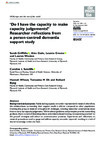‘Do I have the capacity to make capacity judgements?’ Researcher reflections from a person-centred dementia support study
| dc.contributor.author | Griffiths, Sarah | |
| dc.contributor.author | Gude, A | |
| dc.contributor.author | Greene, L | |
| dc.contributor.author | Weston, L | |
| dc.contributor.author | Sutcliffe, CL | |
| dc.contributor.author | Wheat, Hannah | |
| dc.contributor.author | Oh, Tomasina M | |
| dc.contributor.author | Byng, Richard | |
| dc.date.accessioned | 2022-04-04T12:45:11Z | |
| dc.date.available | 2022-04-04T12:45:11Z | |
| dc.date.issued | 2022-02-11 | |
| dc.identifier.issn | 1471-3012 | |
| dc.identifier.issn | 1741-2684 | |
| dc.identifier.other | 147130122110673 | |
| dc.identifier.uri | http://hdl.handle.net/10026.1/18994 | |
| dc.description.abstract |
<jats:sec><jats:title>Background and purpose</jats:title><jats:p> Adults lacking capacity are under-represented in research; therefore, the evidence-base surrounding their support needs is inferior compared to other populations. Involving this group in research is fraught with challenges, including researcher uncertainties about how to carry out capacity judgements. Whilst ethical guidelines and principles provide overarching guidance, there is a lack of detailed guidance and evidence-based training, incorporating practical ‘on the ground’ strategies and advice on communication practices. Experiences and reflections on research procedures used to gauge and address capacity are under reported, resulting in a lack of shared knowledge within the field. </jats:p></jats:sec><jats:sec><jats:title>Design</jats:title><jats:p> To help address this, we engaged in researcher (co)meta-reflection on the informed capacity judgement procedure for initial consent, within our current, person-centred dementia intervention feasibility study. Our objective was to identify areas to improve our approach, but to also put forward suggestions for wider change within ethical research practice. </jats:p></jats:sec><jats:sec><jats:title>Results</jats:title><jats:p> Findings reveal challenges and facilitators relating to six areas: ‘Conducting time sensitive research whilst remaining person-centred and building relationships’; ‘Information sharing and supporting communication’; ‘Applying the process flexibly’; ‘The role of the carer and the consultee process’; ‘Judging assent and dissent’ and ‘Researcher related factors’. We questioned our ‘capacity to make capacity judgements’ in terms of both our skills and research time constraints. </jats:p></jats:sec><jats:sec><jats:title>Conclusions</jats:title><jats:p> Based on our experiences, we argue for greater open discussion between researchers, Patient and Public Involvement contributors and Research Ethics Committees at initial project planning stages. We recommend training and guidance focuses on building researcher skills in applying a standard process flexibly, emphasising naturalistic, conversational approaches to capacity judgement. A crucial consideration for funders is how this time-intensive and sensitive work should be factored into bid application templates and funding grants. Learnings from this article have potential to inform evidence-based guidance and training for researchers, consultees, funders, reviewers and ethics committees. </jats:p></jats:sec> | |
| dc.format.extent | 972-994 | |
| dc.format.medium | Print-Electronic | |
| dc.language | en | |
| dc.language.iso | en | |
| dc.publisher | SAGE Publications | |
| dc.subject | Dementia | |
| dc.subject | research participation | |
| dc.subject | capacity judgement | |
| dc.subject | reflection on research practice | |
| dc.subject | research practice recommendations | |
| dc.title | ‘Do I have the capacity to make capacity judgements?’ Researcher reflections from a person-centred dementia support study | |
| dc.type | journal-article | |
| dc.type | Journal Article | |
| plymouth.author-url | https://www.webofscience.com/api/gateway?GWVersion=2&SrcApp=PARTNER_APP&SrcAuth=LinksAMR&KeyUT=WOS:000759242700001&DestLinkType=FullRecord&DestApp=ALL_WOS&UsrCustomerID=11bb513d99f797142bcfeffcc58ea008 | |
| plymouth.issue | 3 | |
| plymouth.volume | 21 | |
| plymouth.publication-status | Published | |
| plymouth.journal | Dementia | |
| dc.identifier.doi | 10.1177/14713012211067320 | |
| plymouth.organisational-group | /Plymouth | |
| plymouth.organisational-group | /Plymouth/Faculty of Health | |
| plymouth.organisational-group | /Plymouth/Faculty of Health/Peninsula Medical School | |
| plymouth.organisational-group | /Plymouth/REF 2021 Researchers by UoA | |
| plymouth.organisational-group | /Plymouth/REF 2021 Researchers by UoA/UoA03 Allied Health Professions, Dentistry, Nursing and Pharmacy | |
| plymouth.organisational-group | /Plymouth/Research Groups | |
| plymouth.organisational-group | /Plymouth/Research Groups/FoH - Community and Primary Care | |
| plymouth.organisational-group | /Plymouth/Research Groups/Institute of Health and Community | |
| plymouth.organisational-group | /Plymouth/Research Groups/Institute of Translational and Stratified Medicine (ITSMED) | |
| plymouth.organisational-group | /Plymouth/Research Groups/Institute of Translational and Stratified Medicine (ITSMED)/CCT&PS | |
| plymouth.organisational-group | /Plymouth/Research Groups/Plymouth Institute of Health and Care Research (PIHR) | |
| plymouth.organisational-group | /Plymouth/Users by role | |
| plymouth.organisational-group | /Plymouth/Users by role/Academics | |
| dc.publisher.place | England | |
| dcterms.dateAccepted | 2021-11-29 | |
| dc.rights.embargodate | 2022-4-7 | |
| dc.identifier.eissn | 1741-2684 | |
| dc.rights.embargoperiod | Not known | |
| rioxxterms.funder | National Institute for Health Research | |
| rioxxterms.identifier.project | Dementia - Person Aligned Care Team (D-PACT) | |
| rioxxterms.versionofrecord | 10.1177/14713012211067320 | |
| rioxxterms.licenseref.uri | http://www.rioxx.net/licenses/all-rights-reserved | |
| rioxxterms.licenseref.startdate | 2022-02-11 | |
| rioxxterms.type | Journal Article/Review | |
| plymouth.funder | Dementia - Person Aligned Care Team (D-PACT)::National Institute for Health Research |


